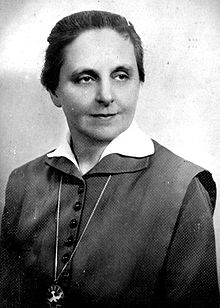Margit Slachta
| Margit Slachta | |
|---|---|

Margin Slachta dressed in the SSS habit
|
|
| Born |
September 18, 1884 Hungary |
| Died | January 6, 1974 (aged 89) New York City |
| Nationality | Hungarian |
| Occupation | Sisters of Social Service |
| Known for | Political action, Social work |
Margit Slachta (or Schlachta, September 18, 1884 – January 6, 1974) was a Hungarian social activist. In 1920 she was the first woman to be elected to the Hungarian diet, and in 1923 she founded the Sisters of Social Service, a Roman Catholic religious institute of women.
Born in Kassa, Hungary in 1884. At a young age Margit and her parents left to live in the United States for a brief period. upon their return to Hungary, Margit trained at a Catholic school in Budapest as a French and German language teacher.
A champion of human rights, she formed the Union of Catholic Women, an organization to promote the female franchise in Hungary, and in 1920 became the first woman to be elected to the Hungarian diet. In 1908 Slachta joined a religious community, the Society of the Social Mission. In 1923 she founded the Sisters of Social Service. The Social Sisters were well known throughout Hungary for nursing, midwifery, and orphanage services. The community opened professional schools for social work in Budapest and Cluj. Some students joined the religious community, others joined an affiliated lay association.
The first anti-Jewish laws were passed in Hungary in 1938, and from that time on, Slachta published articles opposing anti-Jewish measures in her newspaper, Voice of the Spirit. In 1943 the government suppressed her newspaper, but Slachta continued to publish it "underground".
Hungary joined the Axis Powers in 1940. In the autumn of 1940, Jewish families of Csíkszereda, were deported eventually arriving in Körösmezö in Carpathia-Ruthenia. Slachta responded immediately to reports in 1940 of early displacement of Jews. She wrote to the parish priest at Körösmezö requesting him to inquire into their welfare. The removal process stopped on the evening of 9 December when a telegram from the Ministry of Defense ordered the release of the detainees. It was the same day as the dateline on her letter to the parish priest. The report reveals that the captain in charge had received a telegram at 7:00 p.m.that ordered him to immediately release the Jews in his custody and to send them back to Csíkszereda.
She coupled zeal for social justice religious convictions in rescue and relief efforts. In the years immediately following World War II, she raised awareness of the considerable contribution of Protestant churches in rescue efforts.
...
Wikipedia
